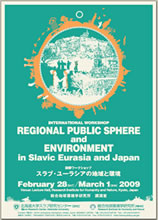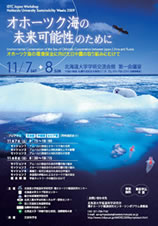|
INTERNATIONAL
WORKSHOP Regional Public Sphere and Environment in Slavic Eurasia and Japan |
 |
|
| Date: |
Feb 28 (Sat) - March 1 (Sun) 2009 |
|
| Place: |
Lecture Hall, Research Institute for Humanity and Nature |
|
| Organizer: |
Research Institute for Humanity and Nature(RIHN) Slavic Research Center(SRC), Hokkaido University |
|
| Contact: |
Research Institute for Humanity and Nature(RIHN) http://www.chikyu.ac.jp |
|
| Objectives : |
The post-communist (Slavic Eurasian) countries are, by and large, stabilizing in their political and economic transformation, though the peoples there are still struggling for their right place in the changing social and regional settings around them. One of the most critical issues in this concern is the publicity or how to manage the public goods - in the broader sense - in various spatial levels including community, sub-national, and regional (trans-national) ones, and throughout the levels as well. Concretely, we are thinking on the minority issue, the religious tradition, the education, the social organization, social policy, the access to the crossing borders especially over the EU or the Schengen borders, the media, the environmental protection and so on. These issues need open discussion, common understandings, and cooperation of the peoples in each levels and across the levels. To handle these issues as public goods, including its regional (trans-national) aspects, is new for the peoples in the Slavic Eurasian countries, but the situation is not so much different in the East Asian countries to manage the publicity under the on-going social and regional changes, because they neither have paid little attention to the aspects of publicity in any levels. In the workshop, aiming at comparative studies of the two regions, we will have papers focusing on the social and historical aspects of the issue, on the one hand, and on the other hand we put an special emphasise on the regional-environmental aspects of the issue, considering that, for one thing, a trans-national solution is more and more demanded in the environmental protection, and, for the other thing, recently the Japanese government conducted an agreement with Hungary on emissions trading, and the government is widening the trading to other Slavic European countries. This means that we will not be able to ignore the other’s publicity in the future, and we need multi-disciplinary cooperation of various specialists, because the emissions trading is a comprehensive deal, requiring many approaches such as economic, social, political, technological, biological, metrologic al, and so on. The workshop is the first step to discuss the publicity from the comparative and multi-disciplinary perspectives, involving the specialists of humanities, social and natural sciences. |
| PROGRAM: |
|
| February 28 (Sat) | |
| 11:00-11:05 |
Opening Remarks TACHIMOTO Narifumi, Director-General,
RIHN |
| 11:05-11:10 |
Opening Speech AKIMICHI
Tomoya, Deputy Director-General, RIHN |
| 11:10-11:20 |
Keynote Speech IEDA Osamu,
Slavic Research Center, Hokkaido University |
| Session
1 Cross-national Eco-system and
Trans-national Regulation in Amur-Okhotsk Region |
|
| CHAIR |
SHIRAIWA Takayuki, RIHN |
| 11:20-11:40 |
Social Indicators, Ecological Quality and Regional
Development: an Example from the Transboundary Basin of the Amur
River Sergey S. GANZEY, Pacific Institute of Geography FEB RAS, Vladivostok, Russia |
| 11:40-12:00 |
The “Giant” Fish-Breeding Forest as Global
Environmental Public Goods HANAMATSU Yasunori, RIHN |
| 12:00-12:30 |
Discussion |
| 12:30-13:30 |
Lunch |
| Session
2
Political-economic-climate Changes and Water Ecosystem |
|
| CHAIR |
INOUE Gen, RIHN |
| 13:30-13:50 |
Historical Changes of Agricultural Development and
Water Environment in the Ili River Basin, Southeastern
Kazakhstan, 1936-1998 AKIYAMA Tomohiro, Aichi University |
| 13:50-14:10 |
The Water Problem in Central Asia
and Probable Changes of Water Resources in Nearest Decades as
Reaction on Climate Change and Degradation of Glaciers Igor SEVERSKIY, Institute of Geography, Kazakhstan |
| 14:10-14:30 |
Siberian Winter Roads on the Frozen River and Ponds,
as Public Goods depending on the Local Environment Makoto OKUMURA, Tohoku University |
| 14:30-15:10 |
Discussion |
| 15:10-15:30 |
Break |
| Session
3 Emerging Regional Public Sphere in Central Eastern Europe
|
|
| CHAIR |
KUBOTA Jumpei, RIHN |
| 15:30-15:50 |
Emerging Public Sphere in the Environmental Policy in
Hungary IEDA Osamu, Slavic Research Center, Hokkaido University |
| 15:50-16:10 |
Regional Integration and Trans-national History:
Reflection on the History of Biopolitics in
Central Europe Constantin IORDACHI, Central European University, Romania |
| 16:10-16:30 |
Transcending Ethnic Conceptions of Cross-Border Space Nigel SWAIN, School of History, University of Liverpool, UK |
| 16:30-17:10 |
Discussion |
| 17:40 |
Reception at Grand Prince Hotel |
| March 1 (Sun) | |
| Session
4 Post-communist Public Sphere in Central
Eastern Europe |
|
| CHAIR |
HAYASHI Tadayuki, Hokkaido University |
| 9:30-9:50 |
Social Welfare in Communist East Central Europe: Structure,
Functions and Dynamics TOMKA Béla, University of Szeged, Hungary |
| 9:50-10:10 |
The Pension System as Public Goods in the Czech Republic IKEMOTO Shuichi, College of Economics, Nihon University |
| 10:10-10:30 |
Local Communities in Transylvania in the Period of
Transition NAKAJIMA Takafumi, Gakushuin Women’s College |
| 10:30-11:10 |
Discussion |
| 11:10-11:30 |
Break |
| Session
5 Historical Aspects on Conceptualization of National and Public
Sphere: Slovakian Case |
|
| CHAIR |
NAGAYO Susumu, Waseda University |
| 11:30-11:50 |
The Concept of the
Slovak Nation and Corporate State: The Melding of the Concepts of
Natio, Populus and Gens in the Eighteenth-Century Hungary NAKAZAWA Tatsuya, Fukui University |
| 11:50-12:10 |
The Idea of National Identity of Slovaks in 1848-1914 Milan PODRIMAVSKÝ, Institute of History, Slovak Academy of Sciences in Bratislava, Slovakia |
| 12:10-12:40 |
Discussion |
| 12:40-13:40 |
Lunch |
| Session
6 Historical Aspects on Conceptualization of National and Public
Sphere: Croatian and Hungarian Cases |
|
| CHAIR |
TAMAKI Osamu, Kyoto University |
| 13:40-14:00 |
The Development of
Slavic Reading Clubs and Schools in the Era of National Revival in
Istria ISHIDA Shinichi, Atomi University |
| 14:00-14:20 |
Elementary School as Public Good for the Consumers: Local
Residents and Cegléd Municipal 'Tanya' Schools in Dualistic Era
Hungary WATANABE Akiko, Osaka Kyoiku University |
| 14:20-15:20 |
Concluding Discussion |
| 15:20-15:30 |
Closing Remarks |
